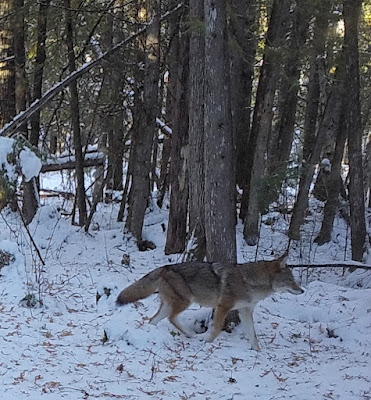Just for a moment let's return to the fact that smallmouth bass are becoming established in Red Lake. No sooner was that fact reported than people started wondering what species they would replace. That knee jerk reaction shows that humans actually do know something about ecology and that we know it at the gut, instinctive level. There are only so many resources available in an ecosystem; if a new species shows up, another species must decline.
You can liken a lake to an aquarium. It's a closed system. There is a set amount of food available. If a new fish is added an old fish must go.
"Please don't let it be walleye," everybody is praying. Walleye are just about everybody's favourite fish. They are good to eat and they are beautiful, which seems to be important.
"Let it be some ugly fish," they say, "like northern pike or, or that really disgusting fish -- ling."
Ling (aka burbot, aka eelpout, aka mariah) are one of Red Lake's native pelagic (deep water) species. Others are lake trout, whitefish and tulibee or lake herring. Here's something that might make walleye fishermen sleep easier: all the pelagic species in Red Lake declined for some unknown reason decades ago. Except for lake trout, they never recovered. Lake trout are slowly coming back through a stocking program.
Soooo, there was actually a void left in the food chain. It is looking like smallmouth bass are now filling it.
"Whew!"
Now I would like to bring up what will seem like an irrelevant fact. Last year was my 50th high school reunion. I graduated from Kirtland High School in Ohio in 1971. "What does this have to do with smallmouth bass in Red Lake?" you are asking. Just give me a minute, would you? I'm going to tie it altogether in a couple of sentences!
Only one year earlier, April 22, 1970, the first Earth Day was celebrated. My class was the first to have a whole year to do something about the environment before we graduated. Do you know what we, the newly-minted ecologists, were worried about? The Population Explosion! There were what seemed at the time an incredible 3.6 billion people in the world, and it was theorized that this could eventually grow to six billion unless the entire world population started having fewer children.
Guess what? A couple of weeks ago the world population hit eight billion! And also guess what? Thousands of species have gone extinct and more are disappearing every day. The Earth, just like a lake, just like an aquarium, is a closed system.
We are the smallmouth bass of the world. Only, in our case, there wasn't a void that we filled. We are replacing everything else.
A study released today shows that one fifth of 50,000 species studied in Canada -- this includes plants, fungi and insects -- are in danger of extinction.
My generation wasn't able to control our population and the whole world has suffered, just as we feared it would in 1970.







